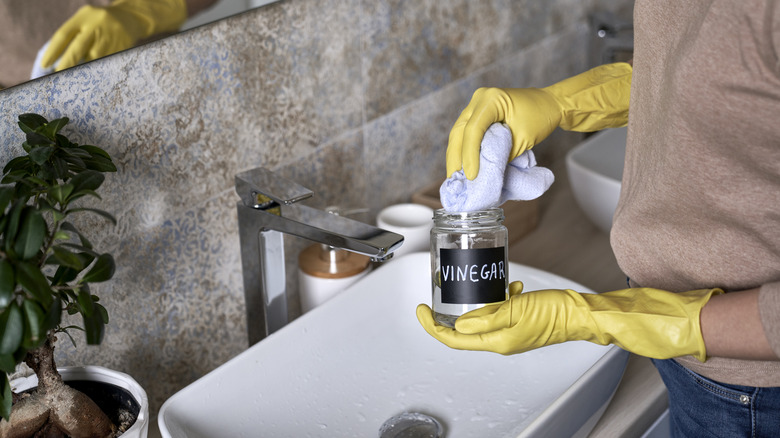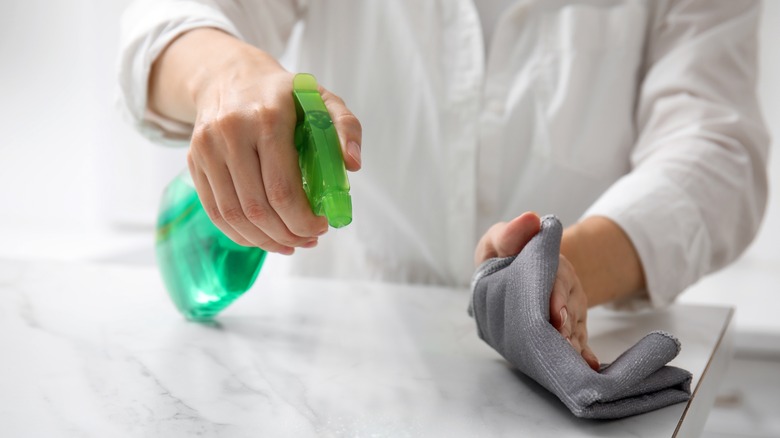Consider These Disadvantages Before Cleaning Your Home With Vinegar
When it comes to cleaning our homes, many of us are constantly searching for the perfect home cleaning solution. The criteria are typically that it's effective, affordable, and safe to use, and there are bonus points if it's good for the planet. White distilled vinegar (5% acidity) or cleaning vinegar (6% acidity) are often touted as fitting the bill perfectly. In fact, some people use vinegar to clean just about anything, from windows to toilet bowls to dining tables.
Although you may love using vinegar to remove hard water stains from glass and rust from silverware, you may be surprised to learn it's not the miracle cleaning ingredient you may have been led to believe. In actuality, cleaning vinegar can pose several health risks and be dangerous to mix with other common cleaners. It also has limited disinfectant properties and can damage some common surfaces it's applied to. That's why it's important to know the pros and cons when it comes to using vinegar to keep your home clean.
Vinegar is natural but not risk-free
A lot of people are drawn to vinegar as a natural, gentler cleaning product than bleach and other disinfectants. Many cite that it's safer for household use because it isn't as toxic or dangerous. After all, you're probably used to drizzling vinegar on your salads, so how potent can cleaning vinegar really be? However, exposure to high levels of acetic acid, the main ingredient of cleaning vinegar other than water, can be dangerous as well.
According to the UK Health Security Agency, exposure to even diluted formulations of acetic acid as found in cleaning products can cause eye, nose, and throat irritation. A greater concentration of vinegar and prolonged exposure to acetic acid vapors can lead to more severe symptoms, including chest tightness, headache, fever, eye damage, confusion, and fluid accumulation in the lungs. If ingested, vinegar can cause breathing difficulty, stomach pain, and vomiting. Even extended skin contact with high concentrations can cause burns and ulcers. For these reasons, you may want to consider only using vinegar sparingly, ensuring you always have plenty of ventilation to avoid exposure to the vapors.
It's also important to note that vinegar presents plenty of risks on its own, but is extremely dangerous to mix with other chemicals as well. You likely already know that bleach and ammonia should never be mixed together, but bleach is also one of many common cleaning products that shouldn't be mixed with vinegar.
Vinegar isn't always the best cleaner or disinfectant
One key reason vinegar is beloved as a household cleaning product is that it's said to be a natural disinfectant. However, cleaning vinegar's disinfectant and sanitizing properties are likely significantly overestimated. According to the U.S. Centers for Disease Control and Prevenion (CDC), vinegar is okay at killing some germs and bacteria, but not all, which is why it is not classified as a disinfectant by the Environmental Protection Agency (EPA). And it's actually only able to eliminate this small amount of bacteria if it's left on the surface for some time. Basically, spritzing your counters with cleaning vinegar and immediately wiping it away won't give the acetic acid enough time to do its thing. A commercially available disinfectant is far more effective and is safe to use as long as you follow the manufacturer's instructions for use and storage, as well as general safety tips from the CDC.
Since vinegar is out as a disinfectant, you may be wondering about using it as a simple surface cleaner, something to wipe dirt and grease away with. Vinegar can be a versatile cleaning tool, but it's not always the right choice. For instance, you should avoid using vinegar on natural stone countertops. For porous, soft stones like marble, the vinegar can eat away at the surface, causing etching and discoloration, and even dissolve protectant seals over time. Vinegar can also break down the seal or varnish on hardwood floors, so you should try to use a cleaner specifically formulated for wood floors.


